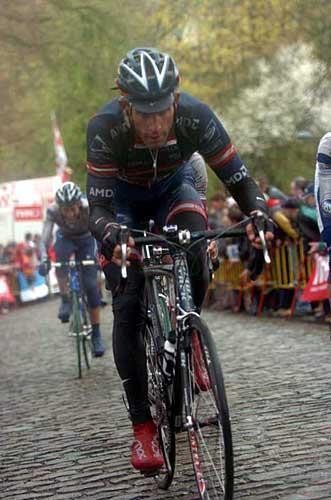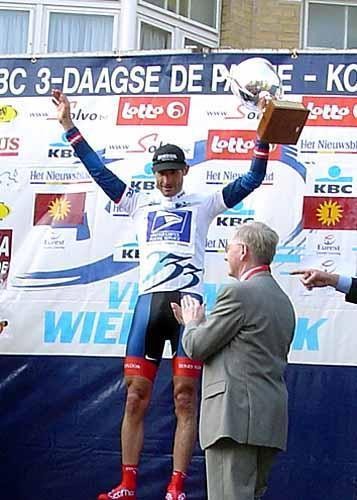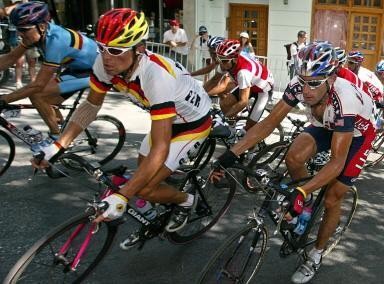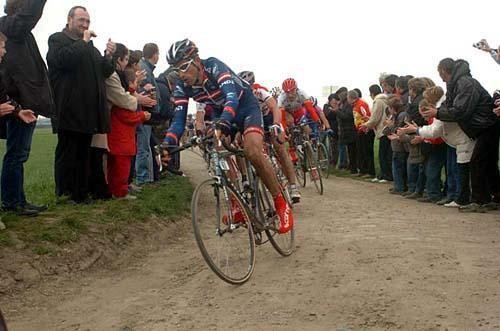Roubaix or bust!
Born: June 29, 1973 Place of birth: Queens, N.Y. Hometown: Charlotte, N.C. Resides when in USA:...




An interview with George Hincapie, November 29, 2004
When one thinks of George Hincapie, the image of a mud-covered cyclist during the 2001 Hell of the North springs to mind first. The second most common sight is George riding mile after mile at the service of his friend Lance Armstrong at the Tour de France, forging a reputation as Lance's strongest and most loyal lieutenant.
But with the birth of his first child one month ago and Armstrong pledging his help at next year's Spring Classics, the focus is shifting for the 31 year-old. Cyclingnews' Mark Zalewski caught up with him in between feedings at his home in South Carolina, before he and his family moves back to Spain for the start of the 2005 season.
Lance Armstrong's right (and sometimes left) hand man has had a remarkable career as one of the top U.S. cyclists in the world ranks. Since turning professional in 1994, he has established himself as a dangerous threat in any of the top one-day classics and smaller stage races - winning races like Gent-Wevelgem in 2001 and the Three Days of De Panne in 2004. A USPRO road champion and a four-time Olympian, he started racing as a junior in the mid-1980s and has not slowed down since.
As part of the Tour de France dominating team of the U.S. Postal Service, Hincapie has grown from a sprint threat on the flatter stages to become one of the strongest lieutenants of The Boss, lasting longer and longer each year up the pivotal mountain passes, all the while becoming a stronger overall rider.
Each year, with the exception of 2003, George begins his season on a campaign for an elusive World Cup win, coming close in 2001 with a fourth at Paris-Roubaix and in 2002 with another fourth in the Tour of Flanders, before shifting focus to Lance and Le Tour. However, next year looks to be a little different for the Greenville, S.C. resident, as Lance has pledged to help him in the Spring Classics and World Cup races, with an obvious goal of finally hoisting the granite trophy in Roubaix.
CN: First thing is first - tell us more about your new addition to the family?
Get The Leadout Newsletter
The latest race content, interviews, features, reviews and expert buying guides, direct to your inbox!
GH: Her name is Julia Paris Hincapie - she was born on November 3, a Wednesday night about three weeks ago. She's doing good, she's sleeping pretty much the whole night - she only wakes up once a night.
CN: Will she be the next great Hincapie cyclist?
GH: [Laughs] I don't know, she'll do whatever she wants!
CN: What have you been doing in the off-season besides becoming a father?
GH: I took three weeks off the bike, just relaxing. Trying to catch up on a bunch of stuff. I went to Las Vegas and New York, but no vacation really. I just spent time here with my family and friends.
CN: In your tenth season as a professional, how would your say that you changed over your career? Are you more cynical or optimistic towards the sport?
GH: Obviously cycling has been in the news a lot lately, and that's always tough to read. But I still love the sport. When I was 12 years old, coming home from school and riding my bicycle 20 miles a day, doing 40 sprints, and doing these crazy training rides because I loved the sport. Obviously the training is different now, and there's a lot more pressure, but I just think about those times when I was doing the sport for fun.
Even though cycling is in the news for a lot of bad reasons lately, there are a ton of more cyclists coming into the sport, older and younger. Every Tour de France I go to, I see more and more Americans and riders along side the road. I go around the country in the off-season doing charity and club rides, and the people just love the sport and love our team. So no matter what some people say, we are doing good, we are inspiring some people. And that is what keeps me going, to see some of the reactions people get when we made history winning the Tour de France. But hopefully things will clean up and it won't be in the news for that anymore.
CN: What was your reaction to Tyler's positive test, as a former teammate and as a friend?
GH: That was tough to swallow, to be honest with you. I know Tyler really well, and I lived with him for three years. It was a shock to see that. I can't imagine him ever doing something like that.
CN: Do you feel for Floyd having to walk into that situation on Phonak?
GH: I definitely hope that Phonak will continue, and I know Floyd went there to have some different opportunities. He had a great year this year, and he just needed some different motivations. I hope that there is no issue with the team, because he deserves to be on a good team.
CN: You had another strong season last year, maybe one of your strongest. What were some of the highlights of last season for you specifically?
GH: Winning Three Days of De Panne was a highlight. I wanted to do well in the races after that, but it didn't really work out. Definitely the Tour, being a part of that again was a highlight.
CN: Did you set out a specific season goal for last year?
GH: I definitely wanted to win a World Cup [race], that was my big goal. So in that sense the season was not a success [laughs]. But I still believe I can do it one day, and I'll keep fighting for that.
CN: Do you think the U.S. Postal team achieved all of the goals it wanted to?
GH: Yeah, the team rode super well - Lance winning the Tour and Max winning 12 or 13 races. The team was really successful throughout the whole year. We won from the beginning of the year through to the end, so it couldn't have gone any better.
CN: What are the goals for you this coming season?
GH: Definitely a World Cup [race] is my biggest goal. If I can continue to do well in some of the smaller stage races like Paris-Nice, I would love to do well in those for sure.
CN: Might there be a World Cup race in particular that you want? [laughing]
GH: Roubaix the first one! And then the Flanders [Ronde van Vlaanderen]... the early season ones, because if you do the Tour, especially the way we've done it, you hope you have good form. You can never really specifically train for [anything], like the Olympics for instance, I went there but was still worn out from the Tour. It's kinda hard to plan for that time of the year, so my goals are for the spring.
CN: Are you going to try to do anything different this year to help ensure you get that World Cup win?
GH: I feel like I've been so close so many times - I'd like to work a little bit on my power and do some more sprint training. Last year I was really disappointed the way Flanders and Roubaix went - where I risked everything as opposed to getting a top five finish. In Roubaix when I bridged up to that one break I spent all of my energy there.
But if that would have worked - it was two or three of us... I'd just like to race more aggressive and just let it all hang out more, even if I don't get a higher up result, so long as I know I did everything I could. Sometimes I don't - in the past I hadn't, and I don't want to finish the race saying I should have done this or that.
CN: Lance has said he wants to focus more on the World Cups for the team and you - will that be the help that pushes you over the edge to the win?
GH: Having Lance at any race is a huge deal. He brings the team up another notch just having him around. When he did Flanders and the other races a couple of years ago it was a big deal, so I am looking forward to it. It should be a lot of fun. The thing is when Lance was doing the Tour of Flanders and all that, it was kind of stressful - it will be different this year since he is doing them because he wants to do them. Last year he was doing it to help me and I was like, great, he's gonna crash because he was helping me! [laughs] But he's an asset to any team and to have him around is a big deal.
CN: What about multi-year plans? Are you making any moves for long-term goals?
GH: Not really. I feel really good right now, just doing some easy training - staying focused. I've got a job and now a family. It's almost like a new motivation, and I just hope I can have a good year.
CN: What was racing in the U.S. like for you last year?
GH: Not great. I did Georgia and I was worn out from the Classics, so that didn't go too well. It was fun to race so close to home - it had great courses and well organized. It was definitely fun to see, I just wish I was racing a little better. The only other race was San Francisco, and that went pretty well - I was third. I was there to try and win the race, but I didn't have it in the legs. I trained well for it, but I guess I was just a little worn out from the long season. But the guy who won was riding really well and had a great day.
CN: Do you see racing in the U.S. more as part of your future, especially with the family?
GH: No, my family is going to travel - we have a place over in Spain, and they'll be over in Europe the same time I will be racing there. I assume my season will be pretty much the same next year with the Classics and the Tour. There are a bunch of races coming up in the U.S. and if I could do some of them, that would be fun also.
CN: Is there anything the team didn't accomplish last year that will become a goal for this year?
GH: We didn't win a World Cup [race] and that is something that we've wanted to accomplish. Definitely that.
CN: Anything surprising with your team regarding transfers? Are there any you think will be a significant addition or loss?
GH: We got a bunch of good new riders - Popovych, Salvodelli, Danielson, Leif Hoste, Roger Hammond - we'll be really complete next year - a lot of big guns coming in! Obviously, we lost Floyd, Victor - those are bummers but they just wanted different opportunities and you've got to respect that. That is just part of the sport.
CN: What were your reactions to the U.S. showing in Olympic cycling this year?
GH: It was just super, super hard - which it was for everybody so it's not an excuse. For me I just didn't feel fresh. It took me a long time to get recovered from the Tour. Sometimes you can just wing it after the Tour - you can have one day where you don't feel good but can still ride really well, and you end up doing a good race, but it didn't work out for me that way. I was spent in the beginning [laughs] and just barely finished that race. It was kind of a bummer - it was a really good course but there wasn't really anything I could do - so I was disappointed with the end result.
The experience was fun though! I finally got to stay at the Olympic Village, which I had never done before. That was my fourth Olympics and we always stayed away from the village, so it was actually a lot of fun doing that. I did a lot of pin trading, got into the Olympic spirit, so it ended up being a lot of fun!
CN: The selection of the team was different than in past year, and was the topic of many discussions. Do you agree with the new procedures, or do you think that should be revisited before the next Olympics?
GH: I don't think they expected the Americans to do so well - two [U.S.] guys in the top five in a Grand Tour, unheard of for U.S. cycling. And another two guys in the top five of hors categorie stage races, and Levi was in the top three! The Americans had a great year this year, and I think they way they worded the selection process was just out of range from what they thought.
But the U.S. riders rode well. It's tough to say, the team that was there it was a good team - with the exception of Lance, Freddy and Horner, and a few other guys, it was the best riders in the U.S. If you would have added those guys, it would have been a bit different, but who knows how different the result would have been? There's ten guys capable of doing that race in the U.S., and we have five of those.
CN: Following that, what do you perceive the state of U.S. cycling is? Do you think this past season was more of a flash in the pan or a sign of things to come in the future?
GH: I think it's a sign - Lance has helped U.S. cycling tremendously winning six Tours de France, has gotten people into the sport more, and motivated a lot of the younger riders. The TIAA-CREF team that has a lot of the up-and-coming riders and the U-23 national team has several guys that I hear about. A guy that I train with is part of the future of U.S. cycling. It is going to be hard to match what Lance has done obviously, but there is some depth there and hopefully in the next couple of years they will start making the headlines in Europe.
CN: Any names you would put money on to be the leaders of this next generation?
GH: I know of them more than actually know them. I train with a guy, Craig Lewis, and he is really talented and strong - a good climber. I think he can make the next step and he's on the right team to do it. Then you hear about the couple of guys on our team, Mike Creed, Pat McCarty and Tyler Farrar - but I don't know anybody really well because I don't race here.
CN: What about the older guys like Danielson?
GH: Yeah, he's got a huge engine. I don't know him too well, but from what I hear he's got a HUGE engine and just needs to put it to work there in Europe. I think his main thing was learning how the races go in Europe, but he's probably the biggest engine out there coming up.
CN: If you had to give an up-and-comer advice, would you tell him to try a TIAA-CREF team here and learn from domestic racing, or take an opportunity to go straight to Europe?
GH: I was lucky because I [first] raced for a team like Motorola. They can take care of you and not throw you in the mix of things and end up getting lost. If you can get on a team like ours where someone will really take care of you or a team like TIAA-CREF, I would go that route, as opposed to getting on a big European team and not knowing anybody. I think for me, personally, I don't think I would have succeeded in that type of a situation.
CN: In your mind, what needs to happen here in the future to keep this consistency with strong U.S. riders growing?
GH: If we could have a few more teams like TIAA-CREF, where they can race against the top riders in the U.S. and do stints of European races a month at a time - I think they are racing the Baby Giro - and the program where they can go race in Belgium, these programs are really helping out. But some sponsorship dollars coming in [would help]. We're actually going to do the clothing for the TIAA-CREF team this year, so we're pretty excited about that.
CN: How's the company and clothing line doing? Any new products coming soon?
GH: It's doing great! We have over 200 teams now, teams in the U.S. The retail market is doing well - we have Sinclair Imports carrying it, so it is getting into shops all over the country. It is growing quite nicely.
GH: We started making some really cool undershirts, that will be out shortly. I've been wearing them all the time at the gym! They are shirts for working out, and a base layer that is not only for cycling.
CN: Are you doing any diaries this season?
GH: I like to do some with my web site, and I'd like to be able to update it more. I've been lazy with it, but this year I'm going to put more effort in it!
See also: Recharged and ready to rumble - An interview with George Hincapie, March 20, 2004
Other Talking Cycling Interviews